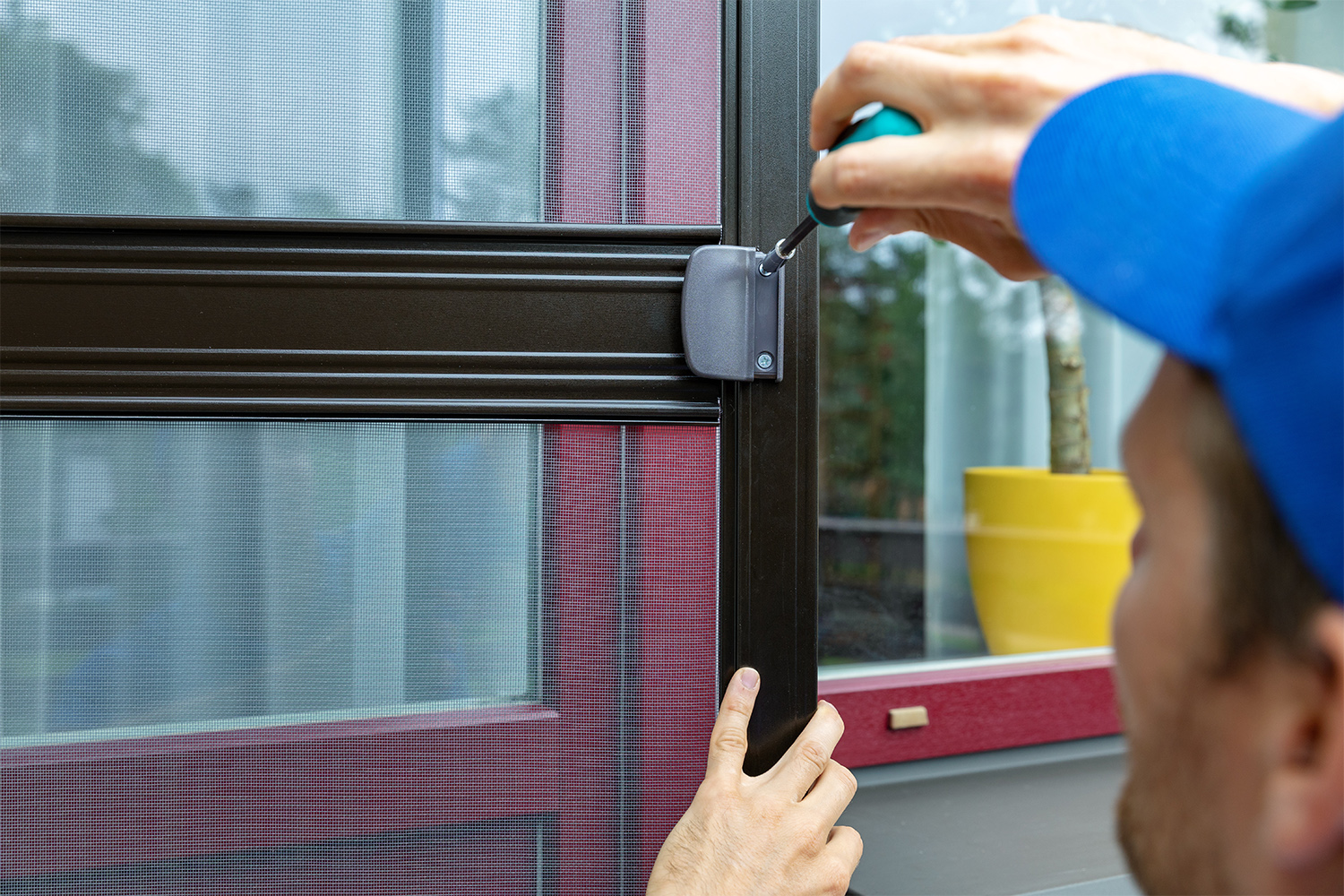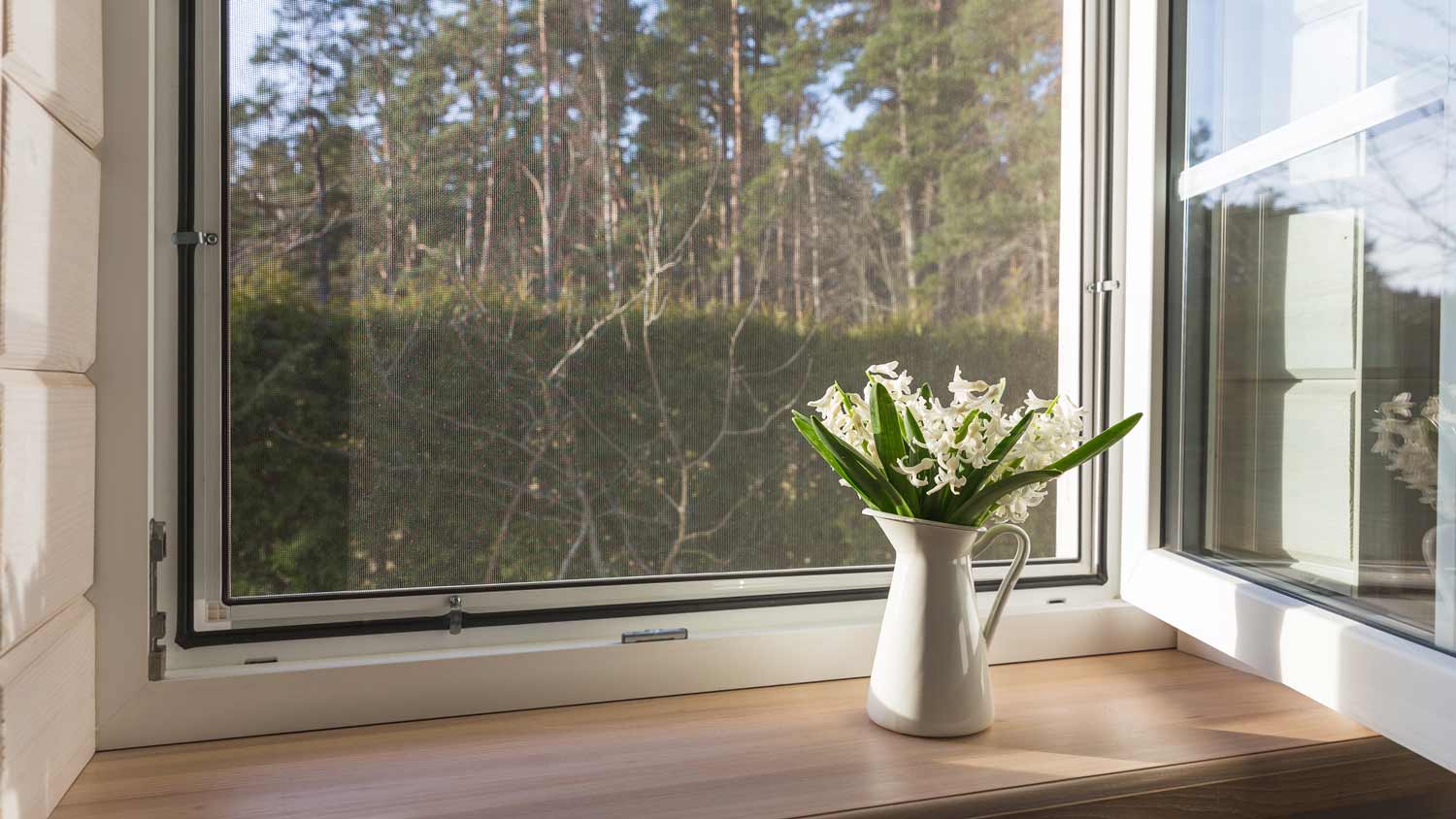Screen Door Buying Guide
Learn what to consider before installing a breezy new screen door


Buying and installing a screen door is a home improvement task that you can likely take on yourself if you are handy or otherwise trust in your DIY talents. However, you do need to decide whether you want a hinged, retractable, or sliding screen door. And, depending on the complexity of the existing door frame, you may want to consider hiring a professional handyperson to handle the project. Learn what factors to consider before buying and installing a new screen door.
What Do I Need To Know About Buying a New Screen Door?
The main goals of a screen door are to improve your home’s airflow, increase natural light, block insects, and add some protection from the elements to your home’s exterior doors. Plus, a new screen door can also help boost curb appeal.
Nearly every exterior door on your home should be able to have a screen door installed in front of it.
The screen may also be able to be replaced or fitted with glass. In this case, the screen door is technically called a storm door.
Standard hinged screen doors can usually be attached in front of or behind your exterior doors, depending on your preference and the structure of your doorframe. Sliding or retractable doors may have to be situated on a particular side to fit the tracks within the existing door jamb.
Screen Door Costs
A single exterior screen door costs $300 on average for labor and materials. If you choose to install the screen door yourself, you’ll save between $100 and $150 on labor. The door price will vary depending on the materials you choose for your door frame and screen mesh. For example, aluminum or vinyl doors tend to cost less than wood doors.
Types of Screen Doors

There are several different options for screen doors depending on the size, shape, and style of your existing door frame, the style of your home, and your personal preference.
Retractable Screen Doors
These screen doors retract or nearly disappear into the doorframe when they are open, making them an attractive option. They consist of a metal frame with tracks on the top and bottom, a canister that houses the screen on one side, and a magnet or hook that holds the door on the other side. It all mounts on the inside or outside of the existing door jamb.
Retractable screen doors are typically more expensive to purchase and install than hinged or sliding doors. These screen doors can also snap shut quickly, making them a potential hazard for small children and pets.
Hinged Screen Doors
The most common type of screen door, hinged screen doors are essentially a standard hinged door with a screen instead of a solid material. They usually have three-part hinges on aluminum or vinyl frames, and may also have glass panels that can slide or lock open. Some hinged screen doors have dampeners so they won’t slam closed due to wind or drafts.
Sliding Screen Doors
These are your typical sliding doors, but with a screen instead of a glass panel or other material. They open and close on a track that has either rollers or tensile springs. You will likely need these types of screen doors if you have sliding glass patio doors on the rear or sides of your home.
Screen Door Materials
You’ll need to decide on your door frames and the type of mesh screens you want in your new door. Frames are typically made of aluminum, vinyl, or wood. Aluminum and vinyl are more affordable and offer a wider range of color options. Wood is more stylish but less durable.
Your typical screened-in porch uses mesh window screens to let in light, fresh air, and clear views while protecting your home from pests and debris—the tighter weave, the better it protects. These screens are available in a few sizes:
18 by 16 mesh: Ideal for porches and patios
18 by 14 mesh: Suited for pool enclosures and saltwater climates that require stronger material
20 by 20 mesh: Best for windows and keeping out tiny insects
In addition to different sizes, you’ll also come across a variety of different mesh materials:
Aluminum Screens
Strong, durable and easy to clean, aluminum mesh is ideal for high-traffic areas. It resists sagging, rust, heat, and UV light. It also stands up to high winds, which could crease or dent other materials.
Aluminum is an affordable screen mesh screen material. You’ll find it in several colors, but black and charcoal offer glare resistance and better visibility.
Bronze and Copper Screens
Bronze and copper are ideal for humid or coastal areas where moisture and salty air won’t corrode or oxidize. These screens are as durable as aluminum but do not pair well with aluminum door frames because the mixed metals will corrode.
Fiberglass Screens
One of the most common and affordable screening materials, fiberglass is lightweight, easy to install, and simple to flatten, should become dented or bent. This screen won’t rust while it works to filter light, air, and bugs, but it will stretch and fade over time. This means you might have to replace it sooner than other mesh materials.
Coated Polyester Screens
Coated polyester is a specialty screening material that offers a protective barrier against insects, debris, and heavy objects. It’s a great option for a security door and even golf ball protection or pet resistance. It’s also commonly used in cold climates because it repels moisture and won’t succumb to freezing temperatures.
Clear Vinyl Screens
Vinyl screening traps cool air in hotter climates and warm air in cooler climates, making it a great option to upgrade your home's energy efficiency. It’s also a clear material, which means your view won’t be compromised as you watch the rain and snow fall outside. It also stands up well to rowdy pets.
Pet-Resistant Screens
Pet-resistant screens are a heavy-duty option that can handle those random energy spurts and cravings to chase down the squirrels wandering in the yard. These tough screens also work well in windy climates that might experience flying debris.
Plastic Screens
Plastic screening includes options made from PVC, nylon, polyethylene, and other plastics. These screens are easy to install and clean. They last a long time and are durable and flexible enough to resist heat, UV light, weather, and insects, as well as acids and alkali.
Solar Screening
While most screens prioritize natural light, solar screens boast a dark exterior that blocks and absorbs excess heat and light while providing additional privacy. They are the most expensive screening option, but in sunny climates, they can help reduce air conditioning costs and protect your furniture and décor from fading in the sun.
Stainless Steel Screens
Treated stainless steer offers a shiny silver color that won’t rust or fade over time. This screen ventilates fresh air without sacrificing bug protection or your outdoor views. Stainless steel is also strong and durable, making it one of the safest screening materials when paired with the right locking system.
Locks
While regular locks provide additional security, screen door locks mainly keep doors closed. Consider the pros and cons of a security door if you’re looking to balance home protection with the ventilation of a screen door.
To pick the right lock for your screen door, decide what type of locking system you want:
Keyed: Often a pull or twist handle with a keyed lock
Mortise: A keyed handle with a spring-loaded bolt most often used on storm doors
Latch and pull: Common on sliding screen doors, with latch accessible from indoors
Push-button: A simple lock with a button on the handle, may or may not be keyed
You’ll find screen door locks made of metal, stainless steel, brass, plastic, and aluminum, with finishes that range from flat, neutral tones to metallic. Choose a lock that matches the thickness and material of your screen door.
How Do I Know What Size Screen Door to Buy?
Knowing the size of screen door you need seems easy—just measure the frame or the old door and buy a new one that matches up, right? Not so fast: You’ll also want to make sure you have some clearance so the door closes all the way.
How to Measure Your Door for a New Screen Door
When you measure your door frame for a new screen, you should subtract 0.25” from the height and width to get the correct size. For instance, if the width of your door frame is 32.25” inches and the height is 82.5” inches, then you’ll want a screen door that is 32 inches wide and 82.25” inches tall.
Can I Install a New Screen Door Myself?
Most basic retractable screen doors are simple installation projects. If you have DIY experience and a few basic tools, you can install a screen door yourself during a free afternoon. These doors are often one-size-fits-all for standard door frames and only become complex or difficult if adjustments are needed.
On the other hand, if you want to add a hinged or sliding screen door, you might want to look for a general contractor or professional door installer in your area. You’ll avoid the risk of damaging the accompanying solid door and save yourself some time in the process.
What Else Should I Consider When Buying a Screen Door?
In addition to the width and height of the door, you want to make sure the knob is on your preferred side–left or right–and that it is not too high or stands out too far from the door, which can prevent the door from closing all the way.
You also may want to avoid a screen door that automatically locks, making it all-too-easy to accidentally lock yourself out (been there, done that). Screen doors usually have a basic lock or latch, but they should be part of your home security gameplan, as they rarely feature a separate lock and key system like a solid door does.
Finally, consider the cost of the time and amount of labor (including any necessary tools) it will take you to install a new screen door yourself versus having a contractor do the work. It might be best to outsource and ensure you get a perfectly fitted new screen door to greet you every time you come home.





- Storm Door vs. Screen Door: How to Choose the Right One for Your Home
- How to Improve Your Screen Door Security for Better Peace of Mind
- 6 Types of Window Screens to Keep Bugs Out While Letting Light In
- Common Types of Screens for Porches and How to Choose One
- 5 Ways To Make Your Front Door Energy Efficient
- Standard Door Sizes for Interior and Exterior Doors
- Do I Need a Storm Door? What to Consider
- 23 Types of Doors for Inside and Outside Your Home
- 7 Types of Interior Doors to Use in Your Home
- Need Door Repair? Who to Hire for a Sticking Door









